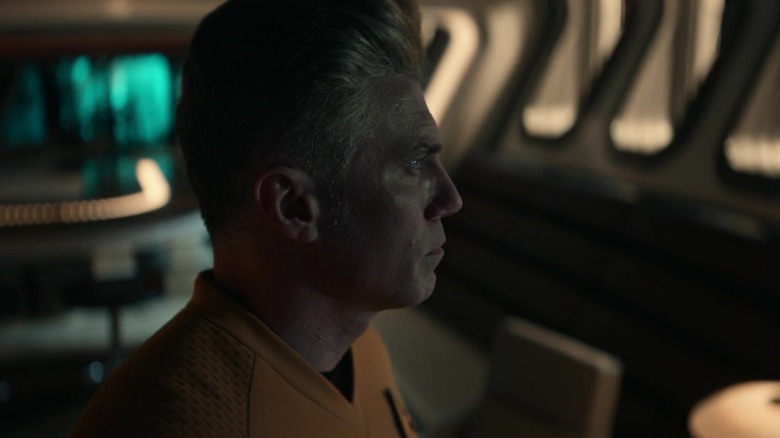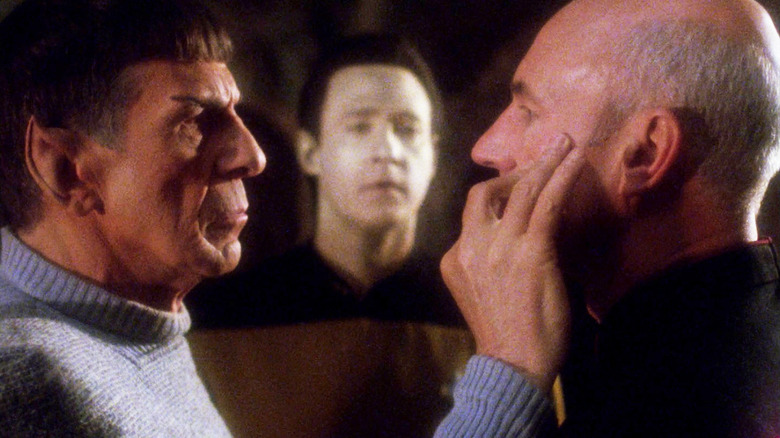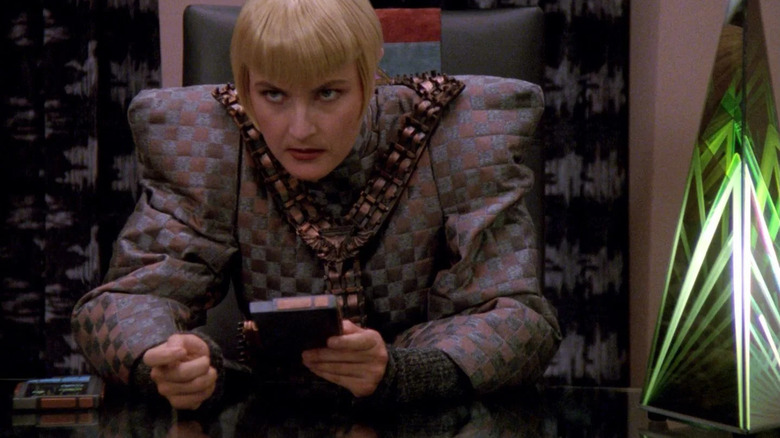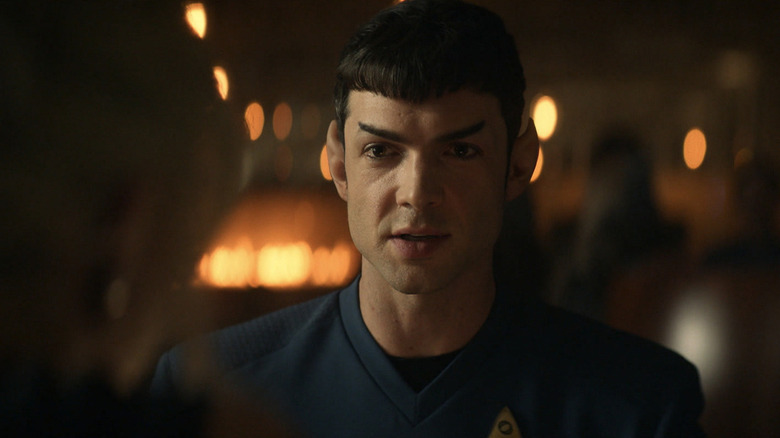Star Trek: Strange New Worlds Just Referenced A Famous Star Trek: The Next Generation Two-Parter
This article contains major spoilers for the season finale of "Star Trek: Strange New Worlds."
"Star Trek: Strange New Worlds" has, until the season finale, titled "A Quality of Mercy," handled its fan service quite gently. Seeing as the show is stocked with recognizable characters and settings (Spock, Pike, Number One, Uhura, Dr. M'Benga, the original Enterprise), it can be said to stand as fan service as a whole. Beyond that, there have been a few notable references to extant Trek canon (a character from one of the "Star Trek" movies makes a brief cameo at the end of "The Serene Squall," for instance), but little else designed to make Trekkies salivate with recognition.
Until "A Quality of Mercy," an episode that throws Captain Pike (Anson Mount) forward in time to the events of the 1966 "Star Trek" episode "Balance of Terror." To remind the reader, that was the episode where Captain Kirk (William Shatner) faced off against a mysterious Romulan ship, and had to use clever submarine-like tactics to outwit a cunning Romulan Commander (Mark Lenard). "A Quality of Mercy" is a full-bore, fan-placating "what if?" scenario, asking how that same episode might have played out if Pike — and not Kirk — was in the command chair. Dialogue is repeated, and familiar characters reappear, including an alternate Kirk (Paul Wesley).
And because causality games and extrapolating alternate timelines are among a Trekkie's favorite activities, the Pike-in-Balance-of-Terror scenario also reflects changes in Trek's potential future canon. Over the course of "A Quality of Mercy," something happens to Spock (Ethan Peck) that would have adversely affected his ability to be a diplomat in the 24th century, stymieing his ability to negotiate peace between the Romulans and the Vulcans in the "Star Trek: The Next Generation" two-part episode "Unification"
Unification, part I
"Star Trek: The Next Generation" was always somewhat reluctant to make direct references to the original "Star Trek." While at least one early episode of NextGen was a remake of an original series episode ("The Naked Now" was a remake of "The Naked Time"), and there was a notable cameo from DeForest Kelley in the NextGen pilot, the show was still determined to be manifestly its own entity. By the time the series had reached its fifth season, however, it had already established itself as the recognizable pop culture organism it sought to be, and was freer to incorporate characters from the original series more freely. Hence, the appearance of Spock (Leonard Nimoy) in a two-part episode about a potential peace treaty between Vulcans and their distant genetic cousins, the Romulans.
"Unification" aired on November 4, 1991 and November 11, 1991, and features several significant Trek events. In the two-parter, we learn what Spock has been up to since his last appearance in "Star Trek V: The Final Frontier" ("Unification" aired shortly before the release of "Star Trek VI: The Undiscovered Country"), namely, that he has spent decades in secret talks with Romulan senators, preparing the Romulan government for a loosening of their strict rejection of Vulcans. Picard (Patrick Stewart) and Data (Brent Spiner) go to Romulus in disguise to contact Spock and let him know about the sudden death of his father Sarek (Mark Lenard, in his second significant Trek role). "Unification" also sees the return of Denise Crosby, now playing the villainous Sela, the adult, half-Romulan child of Tasha Yar from an alternate timeline (it's complicated, okay?).
Unification, part II
By the end of "Unification Part II," much has gone awry, and Sela has caused no end of trouble for Spock, Picard, and Data. A Romulan war fleet disguised as a peace envoy becomes involved as well. The war efforts are foiled, naturally — war would not become a serious consideration for Trek until "Deep Space Nine" breached the topic years later — but so would diplomatic efforts. Spock takes some professional comfort in the fact that while peace talks have broken down, a very palpable philosophical movement has begun on Romulus. Many of its citizens, it turns out, do long for Vulcan/Romulan peace. That, Spock feels, is at least something.
Shifting back to "Strange New Worlds":
At the end of "A Quality of Mercy," it is revealed that Pike, although trying his hardest to solve the conflict of "Balance of Terror" with diplomacy, unwittingly sparks a mutiny among the Romulans, leading to them calling for reinforcements. Kirk, trying to balance the terror, is equally cavalier in gathering numerous cargo ships (the Romulans don't know they're unpopulated cargo vessels) to make the Federation "fighting force" look larger. The stand-off leads to a far more devastating battle than the one from "Balance of Terror," and many Enterprise crewpeople are injured, including Spock.
Spock will, it is implied, be as grievously injured as Pike was in "The Menagerie," essentially taking Pike's place in history so that Pike may live on. Pike's moral choice is clear: Move forward, knowing for certain that he will eventually become incapacitated by an accident, or hand his fate to a friend. Naturally, Pike chooses the right thing.
Spock's fate
The bookend of "A Quality of Mercy" is a future version of Pike — uninjured — explaining the choice that younger Pike can make. Not only can he trade his fate for Spock's, but doing so would also lead to a more violent, greatly expanded Romulan war that will be fought for years. Pike implies that Spock, now no longer able to fulfill his duties as a diplomat, will no longer act as a catalyst for the events of "Unification," the Romulans and the Vulcans will never negotiate, and there will be no hope of peace, however distant and slight.
"A Quality of Mercy" is a classic Trek moral conundrum along the lines of "The City on the Edge of Forever" (wherein Edith Keeler had to die to prevent a worsening of Word War II) or "Tapestry" (wherein Picard undid a rash event from his youth, and grew into a boring and unambitious man). If you knew your fate was painful, would you undo it, knowing that others would suffer? In the world of Trek — and of this ultra-upstanding version of Pike — the answer is obvious: The needs of the many outweigh the needs of the few.
The entire first season of "Star Trek: Strange New Worlds" is available on Paramount+.



